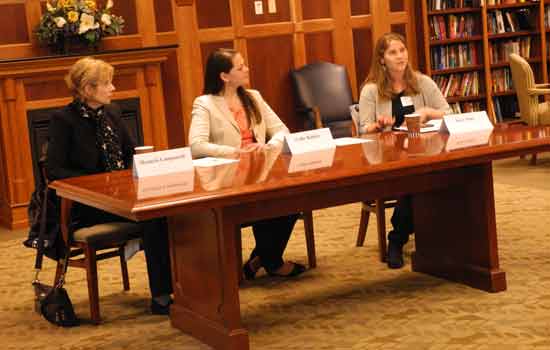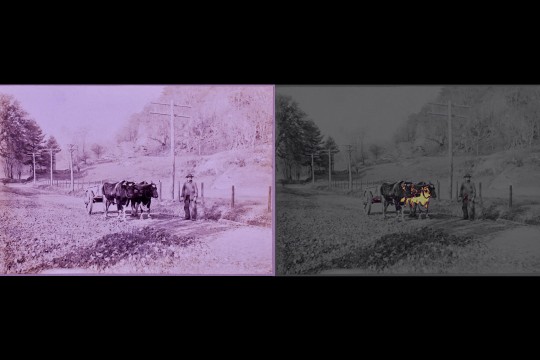Female faculty discuss increasing recognition
Connectivity session panel provides strategic, practical advice for advancing in academia
Michelle Cometa
RIT faculty Manuela Campanelli, left, Callie Babbitt and Kara Maki discussed strategies for increasing recognition of academic work as part of a professional development panel sponsored by AdvanceRIT.
“Talking can transform minds, which can transform behaviors, which can transform institutions.” - Sheryl Sandberg, chief operating officer, Facebook
Nearly 20 female faculty from across campus and at varied stages of their careers “leaned in” this past week for a panel discussion, “Daring Appreciation: Strategies for Increasing Recognition of Your Work.” The event was part of the Connectivity Series, a professional development initiative launched this spring by the AdvanceRIT program, a campus-wide study to decrease institutional barriers to female faculty’s career progression.
The focus of the panel on recognition was based on how rewards and recognition play a part in securing tenure, broadening research initiatives and contacts, and in opening doors to academic service and leadership opportunities as well as promotion.
Panelists were three of the campus’ accomplished female faculty-researchers. They provided strategies about building toward successful recognition including: actively seeking out public forums to discuss work, both on and off campus; relating with senior faculty and campus leadership; developing mentor relationships; and promoting the work of other women, including nominating female peers, or self-nominating for high profile campus awards, committees and leadership positions.
Over a five-year period, from 2007 to 2012, the percentage of RIT campus-based, academic awards received by female faculty was slightly more than 12 percent, according to new research by AdvanceRIT into results of the faculty award process at the university. In this study, the gender distribution of university awards is proposed as an indicator of progress toward achieving parity for female faculty.
Panelists Callie Babbitt, Manuela Campanelli and Kara Maki, all RIT distinguished faculty, have been among that small percentage of female faculty recognized for both effective teaching and influential research. They talked about balancing strategic, purposeful conversations and activities with more personal approaches that allow female faculty to be seen as accomplished as their male counterparts.
Babbitt, assistant professor in RIT’s Golisano Institute for Sustainability, recommended women seek out opportunities to become recognized as subject matter experts by responding to media requests, presenting regularly at conferences, speaking at community events and collaborating on interdisciplinary projects. To her, it is a way to advance information about her field of sustainability and to support efforts of women in STEM fields.
“Recognition for your work is an important part of career advancement,” said Babbitt, a 2013 recipient of the National Science Foundation’s CAREER Development Award. “But it also provides a platform from which I can share advances we’re making in sustainability and help get female students excited about STEM careers.”
Campanelli agreed, and added that being visible allows for different conversations with peers, and seeking out or becoming a mentor. Early in her career, the professor and director of RIT’s Center for Computational Relativity and Gravitation had a mentor who was strong in her field and who gave good advice about the sometimes puzzling and lengthy process of looking into, and applying for, research grant opportunities.
“Seek out a mentor and use the experiences that person has to share. Value what they have to give you,” said Campanelli, who recently was designated as one of RIT’s Trustees Scholarship winners, given in recognition of significant contributions to research. (Professor Jennifer Schneider of the College of Applied Science and Technology also received the prestigious award for this academic year.)
What mentors give can vary from informal encouragement toward goals to the more formal recommendations and endorsements for grants, the tenure process or for collaborative projects, said Maki, an assistant professor of mathematics who came to RIT in 2011. She was designated a Rising Star in RIT’s College of Science in 2013. “Sometimes you have to actively seek out and identify allies or advocates—in your field and within your college. For example, sometimes people may ‘tip their hand’ about who they are in the positive review they have written on your paper or grants. I think of these faculty members as advocates.”
Confidence in their abilities, a desire to learn as well as teach, and an understanding that they must support each other was also key to career advancement for the panelists. But it also meant advocating for other women, and “talking about each other’s work,” said Campanelli.
Connectivity Series programming will continue discussions about that work and other professional development strategies for faculty. More information about the series can be found on the AdvanceRIT website, or by contacting the series coordinators, Sharon Mason, associate professor, information sciences and technology, and Carol Marchetti, associate professor, mathematical sciences.
The AdvanceRIT team’s new research, titled “Faculty Awards at a Large Private Institution: An Indicator of Evolving University Values,” will be presented at the 2014 American Society of Engineering Education annual conference scheduled for this June.
Highlights of Connectivity panelists’ recent research includes:
New Wave Astronomy
Manuela Campanelli, Center for Computational Relativity and Gravitation.
Research into Sustainable Management of End-of-life Lithium Ion Batteries
Callie Babbitt, Golisano Institute for Sustainability
Reshaping Optics Through Innovative Mathematics
Kara Maki, College of Science











